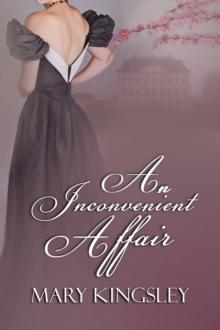- Home
- Kruger, Mary
Rogue's Charade Page 2
Rogue's Charade Read online
Page 2
He rubbed his eyes, as if he had been dazzled, too. “Look!” he yelled, pointing towards the crowd. “He’s getting away.”
Only a few of the soldiers heeded him, but that was enough. They jumped off the platform, and others quickly followed. Good. With all the confusion, Simon’s whereabouts just might still be unknown. And it was time, Ian thought, to make his own departure. “Exit, stage right,” he muttered, and slipped down the scaffold’s stairs.
Simon fell through space, legs flailing in panic, and was caught by hands holding his arms, his shoulders. He struggled, but then the hood was pulled off his head, and he saw his captor. “Uncle Harry!” he gasped.
“Quietly, lad.” Harry’s voice was urgent as he cut the bonds that held Simon’s wrists. “We haven’t much time.”
“Uncle—my God. Where are we?” he asked, stupidly, for events had happened too quickly for him to comprehend them.
“Under the scaffold. Phinney and Henrietta are creating a distraction. Phinney’s made up to look like you, by the way. Let’s get that off you.” Harry pulled the noose over Simon’s head. “Bess, the paint—”
“Yes, Harry,” Aunt Bess said placidly, quickly stroking lines across Simon’s forehead. Charcoal, Simon realized, and at last guessed what they were doing.
“Who planned this?” he demanded, shrugging into the rusty black coat Harry held out.
“Quietly, lad. Henrietta did. Girl’s got a good head on her shoulder.”
“Some powder for your hair,” Bess said, reaching up to untie the ribbon that held his queue. “There! You look quite the old man now, with that gray hair.”
“And you’ll need this.” Harry thrust a cane into Simon’s hand. “Aye, you look the part, but remember, lad, looking’s only part of it.”
Simon grinned. “I remember,” he said, and grasped the walking stick, bending over it. He knew the disguise was crude; he knew that the illusions of the stage were usually all too apparent when seen up close. His family was risking their very freedom to gain him his, however. He could not but fall into their scheme. “How would an old man think, feel—”
“Exactly. I taught you well. Now. There’s no time to lose. There’s a cart waiting at Hyde Park Corner. Ordinary farmer’s cart, you know the thing. Old Gaffer’s driving it.”
“I’ll make for it. And you?” Simon said, sobering.
“We’ll take care of ourselves, lad.” Harry’s voice was gruff as he pushed Simon out through a loose board from the dubious haven under the platform. “Go with God, lad.”
“You, too, uncle. Aunt.” Simon gazed at them, the only real parents he had ever known, and then turned, slipping into the milling, tumultuous crowd. He was free. He was also still in danger.
No one noticed Simon; they were too involved in their own survival. What had been chaos only a few moments before had intensified into something close to a riot. Close by two men were brawling, throwing punches with more enthusiasm than accuracy, while a woman pummeled one of them on the back, screeching at the top of her lungs. More men fought in another mad tangle of arms and legs, while in the distance Simon could hear musket shots. Most people seemed intent on escaping the square, pushing and jostling against each other, so that few made any progress, and more than one pickpocket plied his trade with zest. It was, in short, the best opportunity Simon would have for escape.
Shoulders hunched, muttering as if he were a crazed old man, Simon raised his walking stick, prodding a backside there, a leg there. Men swung around at this fresh indignity, but fell back when they saw him, old and obviously infirm. In most circumstances, Simon knew, the artificiality of his disguise would be obvious. The charcoal lines on his brow, the gray powder in his hair, would never pass close inspection. Today, however, no one challenged him; nor did anyone applaud, though it was the performance of his life.
Ian was gone from the scaffold, Simon noted as he pushed and shoved and prodded his way across Tyburn Lane. Nor was Henrietta anywhere to be seen, or any of the other actors Simon was certain had been here. He was on his own, but that was just as well. His family had endangered themselves enough for him. Now he had to gain his freedom, and thus justify all they had done.
Musket shots sounded again, closer this time, and the people nearest him scattered in panic, nearly knocking Simon over. Somehow he stood his ground, glaring at the soldier who stood only a few feet away, musket leveled. “Shooting helpless old men now, sonny?” he said in a voice that cracked and quavered, and the musket lowered, the soldier turning as bright a red as his uniform. He was very young, Simon noted, little more than a boy.
“Sorry, old man,” the soldier stammered. “Go on your way.”
“What is the world coming to?” Simon muttered, turning. The crowd was thinning, and the pedestrian walkway was just on the other side of the chain and post barrier. Once he reached it he could blend into the crowd, and slip down the street to Hyde Park Corner. Only a few people stood between him and freedom. Unfortunately they were soldiers, apparently returning from trying to find him; worse, one was Craddock. Cursing to himself, Simon abruptly changed direction, plunging into traffic to cross Oxford Street, though it was the opposite of where he wanted to go. He’d have to take a more devious route to his destination and hope that old Gaffer was still there. Still hunched over the walking stick, he shuffled along, muttering, not looking at anyone. Ahead was a quiet side street, nearly empty; once he reached it, he would be safe. Ten feet, then nine, then—
“‘Ere, you!” a voice yelled. “Yes, you, old man!”
“Eh?” Simon turned his head, squinting. Bloody hell. The soldiers were coming toward him, Craddock leading them.
“For God’s sake, Craddock,” one of the soldiers said. “What’s this old bugger got to do with anything?”
“Mayhap he saw somethin’,” Craddock said.
“Him? Look at ‘im. Likely blind as a bat and deaf to boot.”
“Eh?” Simon cupped a hand behind his ear. Run, his instincts screamed, every inch of him quivering with the need to escape. Only by great discipline did he hold still. If he ran, he would only attract attention.
The soldiers were laughing. “Run along, old man,” one of them called. “Don’t get into any trouble.”
“Eh?” Simon said again, but he began hobbling away, leaning heavily on the walking stick. “What is this world coming to, soldiers stopping them what’s minding their own business—”
A man blundered up before him. Startled, Simon straightened, pulling himself up to his full height. “Bloody ‘ell!” Craddock yelled. “Hey, you! Stop, I say. Woodley!”
Simon’s reaction was involuntary. At the sound of his name he turned, realizing a moment too late what he’d done. “Hell,” he exclaimed, and gave up his pose, gave into the voice inside that screamed louder and louder. Run!
“It’s ‘im!” Craddock yelled again. “Stop! Stop, I say, in the name of the king—”
“Ready weapons!” someone else yelled, and musket shot rang out. And Simon, feeling a sudden, sharp pain, realized he’d been hit.
“Things are finally settling down, miss,” the apothecary said, looking out onto Oxford Street through the heavy glass windows of his shop. “Looks like they’ve got the carts heading back to Newgate at last. Won’t be any hanging today, until they catch that Newgate saint who escaped.” He turned away from the window. “It might be safe for you to go. There aren’t as many people now.”
“Good.” Blythe jumped lightly down from the high stool. It had been a frightening hour, waiting out the riot that had erupted when, so they’d heard, the killer who was to be hanged had disappeared from the scaffold in a flash of light. The spectators had scattered in all directions, making the apothecary take up station at the front of his shop, truncheon in hand, against anyone who dared intrude. It appeared now, though, that the danger had passed. “Mrs. Wicket will be furious as it is, that I haven’t returned with her potion.” She and the apothecary exchanged quick, conspiratorial smiles. Mr
s. Wicket might have been one of his best customers, but he knew as well as Blythe that her complaints were mostly imaginary. “I hope she doesn’t turn me off after this.”
“If she does, miss, you’d have no trouble getting another position, I’d be bound,” he said, smiling warmly at her.
Blythe paused very briefly in the act of straightening her mobcap. Good heavens, was the apothecary flirting with her? Well, she’d dealt with this kind of trouble before. A woman alone in London learned to protect herself quickly. “Thank you,” she said, frostily, and sailed past him, head held high. “Good day.”
“Good day, miss,” he stammered behind her, as she gently, but quite firmly, closed the door.
Blythe wasted no time, but quickly set off along Orchard Street, away from the remaining tatters of the crowd and toward the quiet of Portman Square. It was madness to have ventured onto Oxford Street this morning, but things had settled down. She allowed herself a smile as she walked. It was pleasant to have a man flirt with her, she admitted, even if she did have to discourage that kind of thing. Even if the apothecary, a widower, was well known to be on the catch for a wife to care for his six children and help out in the shop. Blythe shuddered. She longed for a home, a family, of her own, sometimes with an intensity that scared her. But she had already spent most of her life in service to others. If she ever married, it would be because she was wanted for her, herself. And that, she thought gloomily as she turned into Portman Square, was not likely to happen.
The square was deserted, with an eerie calm overlaying the scene. The fine houses had a closed-up look, partly because their owners had repaired to their country estates for the summer, but also because of the events of the last hours. People would be safe inside, away from escaped killers and roaming soldiers alike. Not a person moved; not a bird sang in the trees, and in the unnatural hush some remnant of danger remained. Alert, aware, Blythe quickened her steps, wanting now only to reach Mrs. Wicket’s, and safety. She’d had quite enough excitement for one day, she was thinking as she passed a fine townhouse, when there was a quick scuffling noise from an alleyway, followed by a flash of movement. Before she could react, her arm was caught in a strong grip.
“Don’t scream. I’ll not harm you,” a low masculine voice said, and, startled, Blythe looked up at a face she’d glimpsed only briefly, but would never forget. It was the man in the tumbril, the killer who had somehow escaped the scaffold. She was now his prisoner.
Chapter Two
Blythe froze, her limbs turning to jelly, her heart pounding arrhythmically. She couldn’t help it. In times of danger, when other people might scream or struggle she went still, mute, frozen into silence. It shamed her, this weakness, and yet it was how she’d always reacted to danger. “Please,” she managed to croak out.
“I promise, I’ll not harm you,” he said again. “If you’ll just play along.”
Blythe forced herself to look at him. His skin was shiny and pale; his hair disordered. He looked different than he had in the tumbril, older, but in a grotesque way. “Whatever is that on your face?” she asked in a reasonable tone, feeling as if she had split into two people. Outside she must appear normal; inside she quaked, watching the goings-on with fear and a strange detachment.
He grimaced. “Charcoal. Come, princess. We’ll walk a bit and then I’ll let you go. If you play along.”
“An odd word. Play.”
“Ah, but all the world’s a stage.” He smiled, but his grip on her arm hadn’t relaxed. Nor had his gaze, vigilant and ever moving, searching for danger. “We are all merely players, miss—?”
“Good gracious, are you an actor?” she burst out.
It surprised a laugh from him. “As it happens, madam, yes. And is that worse than being gallows bait?”
Blythe flinched, an involuntary action, and tried to pull her arm free. “Please let me go. I’ll not tell anyone I saw you, if you’ll let me go.”
“I can’t, princess.” He sounded genuinely regretful. “They’re looking for a man alone, you see. But a man and a woman together, that’s different.”
“I won’t go with you.” Blythe surprised herself by stopping still. Her first panic had worn off, to be replaced by a deeper fear. If she gave into this man without a struggle, what might happen to her?
“No, princess?” His voice was soft. “I’d hate to have to hurt you, but...”
The words hung there. “But you would.”
He sighed, shrugged, an elaborate lifting of his shoulders. “One does what one must. I’d much prefer”—he tugged at her arm—“that you walk with me and talk to me. ‘Tis too long since I’ve heard a woman’s voice.”
“Talk!” Blythe stared at him as he dragged her along the slate walk. She wondered if any of the people in the neat brick townhouses that fronted the square were watching, witnessing what was happening to her. “Of what should we talk?”
“Of anything, princess.” He smiled, and she saw that his teeth were surprisingly white and even, his eyes surprisingly bright. “Of the flowers in that garden, or London in the springtime. Of the color of the sky. In Newgate,” he said, softly, “I thought I’d never see the sky again.”
Blythe glanced up involuntarily, seeing to her surprise that the sky overhead was deep blue. She hadn’t noticed earlier, so intent had she been on her errand. Nor had it mattered. “How long were you in prison?”
“Too long.” He glanced quickly at her. “I didn’t do it, you know.”
She nodded. “Of course not.”
His eyebrow rose. “You believe me?”
“No. But ‘tis what I’d expect you to say. Of course, you’ll do what you have to to keep me from escaping.”
“I see.” His mouth was a thin, grim slash in his face. “I won’t make you tolerate me for long. Just until—damnation!”
Blythe glanced along the street they had just turned into and saw what had caught his attention. “Soldiers,” she said in relief.
“Yes, damn their eyes.” His grip on her arm tightened, and without any warning he dragged her aside, down some stairs into the service entrance of a nearby house. This time she did let out a noise, a squeak of surprise, and his hand quickly covered her mouth.
She froze again, her limbs going limp as he continued to drag her, into a hollow formed by the house’s front stairs and stoop. “Hush, now, and all will be well,” he whispered.
All would be well? The words penetrated Blythe’s haze of terror. Why, he must think her quite the fool if he expected her to believe that. A man such as he, prone to violence, could have only one end in mind for her. He couldn’t leave her alive, a witness to his escape.
Oddly enough, the thought cleared the last vestige of fear from her mind, leaving in its place a clear, crystal calm in which her every sense was heightened. She was aware of the man holding her, of her back to his chest, of the masculine heat and smell of him, so different from what she was familiar with. She heard, as if there were thousands of them, the soldiers’ footsteps; she felt her captor’s muscles tense as the soldiers approached. And she could see, absurdly, that beyond the stone of the stairs, it was indeed a fine day. Too fine a day to die.
The footsteps neared; her captor’s hand tightened on her face, and it was too much. Squirming, she twisted her head away, and his hand followed, giving her the opportunity she sought. Acting on instinct, she bit down hard on his thumb.
He let out a muffled exclamation of surprise and pain, and yet his grip tightened. “Do that again and I’ll strangle you,” he whispered harshly in her ear, and beyond the stairs one of the soldiers stopped, his feet scuffing the pavement.
“Did you hear that?” the soldier said. “Thought I heard someone yell.”
“Spread out,” a voice commanded tersely, and the sound of booted feet running echoed loudly in the service entrance. “D’ye see anything?”
“Nothing, captain,” a voice came from some paces away. “Haven’t seen hide nor hair of no one on this street.”
&
nbsp; “He’s here someplace.” The captain’s voice was grim. “He was seen heading toward the square.”
More echoing sounds as the footsteps returned. “All’s quiet, sir.”
“Damme. He’s here. If I have to, I’ll search every house...”
“D’you want me to start, captain?” someone asked after a moment.
“What? No. No. No need to alarm anyone. You’re right, no sign of him here. So why are you hangin’ about?” he said, his voice suddenly loud. “Move out!”
The footsteps marched away. Behind Blythe her captor let out his breath, though his muscles were still tight. “If I take my hand away, will you promise not to scream?” he said, his voice low.
Blythe nodded, and a moment later the pressure was gone from her face. She took her first free breath in what felt like hours, gathering herself, and his hand slammed over her mouth again.
“You promised you wouldn’t scream,” he said, and at that Blythe sank her teeth into his thumb again. “Ow!” He pulled back. “Now what did you go and do that for?”
“I was not going to scream,” Blythe said, with as much dignity as possible, considering she was sprawled back against a strange man’s chest. “A lady does not go against her word.”

 Sabrina
Sabrina Rogue's Charade
Rogue's Charade Unsuitable Wife
Unsuitable Wife In a Pirate's Arms
In a Pirate's Arms Crystal Heart
Crystal Heart Inconvenient Affair
Inconvenient Affair Summer Folly
Summer Folly Rake's Reward
Rake's Reward Gifts of the Heart
Gifts of the Heart